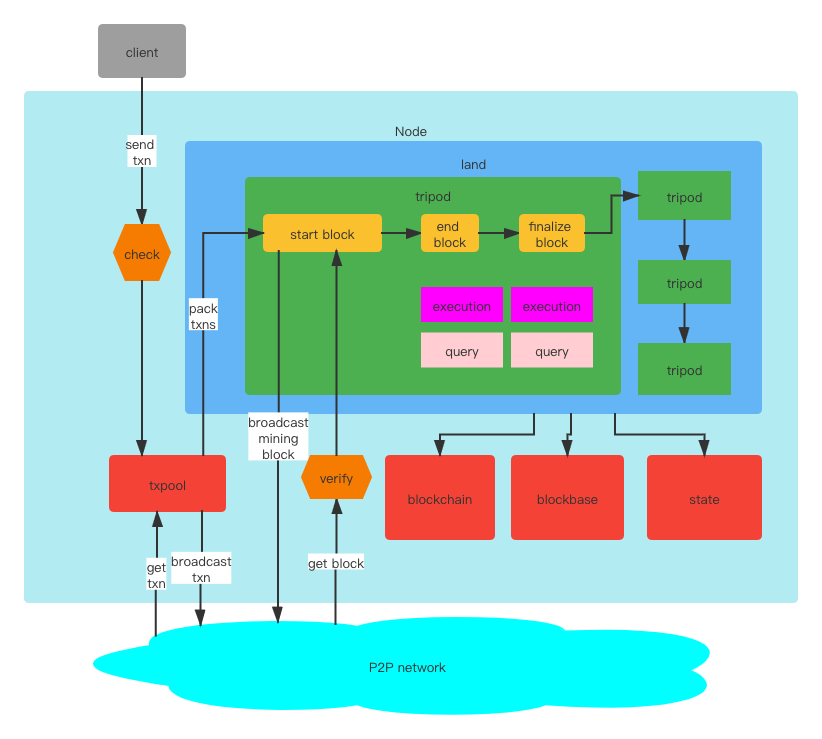禹
Yu is a highly customizable blockchain framework.
Overall Structure
Introduction
By using Yu, you can customize three levels to develop your own blockchain. The Tripod is for developers to
customize their own bussiness.
First level is define Exection and Query on chain.
Second level is define blockchain lifecycle. ( including customizable Consensus Algorithm )
Third level is define basic components, such as block data structures, blockchain, blockbase, txpool.
- Define your
ExectionandQueryon chain.
Executionis likeTransactionin Ethereum but not only for transfer of Token, it changes the state on the chain and must be consensus on all nodes.
Queryis likequeryin Ethereum, it doesn't change state, just query some data from the chain.
type (
Execution func(*context.Context, currentBlock IBlock, *chain_env.ChainEnv) error
Query func(ctx *context.Context, env *chain_env.ChainEnv, blockHash common.Hash) (respObj interface{}, err error)
)- Define Your
blockchain lifecycle, this function is inTripodinterface.
CheckTxndefines the rules for checking transactions(Executions) before inserting txpool.
VerifyBlockdefines the rules for verifying blocks.
InitChaindefines bussiness when the blockchain starts up. You should use it to defineGenesis Block.
StartBlockdefines bussiness when a new block starts. In this func, you can set some attributes( including pack txns from txpool, mining ) in the block, then you should tell the framework whether broadcast the block to other nodes or not.
EndBlockdefines bussiness when all nodes accept the new block, usually we execute the txns of new block and append block into the chain.
FinalizeBlockdefines bussiness when the block is finalized in the chain by all nodes.
type Tripod interface {
......
CheckTxn(*txn.SignedTxn)
VerifyBlock(block IBlock, env *ChainEnv) bool
InitChain(env *ChainEnv, land *Land) error
StartBlock(block IBlock, env *ChainEnv, land *Land) (needBroadcast bool, err error)
EndBlock(block IBlock, env *ChainEnv, land *Land) error
FinalizeBlock(block IBlock, env *ChainEnv, land *Land) error
}Examples
Asset Tripod
Asset Tripod imitates an Asset function, it has transfer accounts, create accounts.
QueryBalance queries someone's account balance. It implements type func Query.
func (a *Asset) QueryBalance(ctx *context.Context, env *ChainEnv, _ Hash) (interface{}, error) {
account := ctx.GetAddress("account")
amount := a.getBalance(env, account)
return amount, nil
}CreateAccount creates an account. It implements type func Execution.
EmitEvent will emit an event out of the chain.
The error returned will emit out of the chain.
func (a *Asset) CreateAccount(ctx *context.Context, _ IBlock, env *ChainEnv) error {
addr := ctx.Caller
amount := ctx.GetUint64("amount")
if a.exsitAccount(env, addr) {
_ = ctx.EmitEvent("Account Exists!")
return nil
}
a.setBalance(env, addr, Amount(amount))
_ = ctx.EmitEvent("Account Created Success!")
return nil
}We need use SetExec and SetQueries to set Execution and Query into Asset Tripod.
When we set a Execution, we need declare how much Lei(耜) it consumes. (Lei is the same as gas in ethereum )
func NewAsset(tokenName string) *Asset {
df := NewDefaultTripod("asset")
a := &Asset{df, tokenName}
a.SetExec(a.Transfer, 100).SetExec(a.CreateAccount, 10)
a.SetQueries(a.QueryBalance)
return a
}Finally set Asset Tripod into land in main func.
func main() {
startup.StartUp(pow.NewPow(1024), asset.NewAsset("YuCoin"))
}Pow Tripod
Pow Tripod imitates a Consensus algorithm for proof of work. It customizes the lower-level code.
- Start a new block
If there are no verified blocks from P2P network, we pack some txns, mine a new block and broadcast it to P2P network.
func (p *Pow) StartBlock(block IBlock, env *ChainEnv, _ *Land) (needBroadcast bool, err error) {
......
// get validated blocks from P2P network, if exists, use it and return.
pbsht, err := chain.TakeP2pBlocks(height)
if err != nil {
logrus.Errorf("get p2p-blocks error: %s", err.Error())
}
if len(pbsht) > 0 {
block.CopyFrom(pbsht[0])
logrus.Infof("USE P2P block(%s)", block.GetHash().String())
env.StartBlock(block.GetHash())
return
}
// if there are no validated blocks from P2P network, we need to mine a block.
needBroadcast = true
......
// pack transactions(Executions) from txpool
txns, err := pool.Pack(p.pkgTxnsLimit)
if err != nil {
return
}
......
// mine a hash for the new block
nonce, hash, err := spow.Run(block, p.target, p.targetBits)
if err != nil {
return
}
block.(*Block).SetNonce(uint64(nonce))
block.SetHash(hash)
......
return
}- End the block
We execute the txns of the block and append the block into the chain.
func (*Pow) EndBlock(block IBlock, env *ChainEnv, land *Land) error {
......
// execute the txns of the block
err := node.ExecuteTxns(block, env, land)
if err != nil {
return err
}
// append the block into chain
err = chain.AppendBlock(block)
if err != nil {
return err
}
......
// flush the txpool to prepare for new txns of the next block
return pool.Flush()
}- Finalize the block
poW does not needfinalizestage, so theFinalizeBlockhas no implements.
Same as Asset Tripod , finally set Pow Tripod into land in main function.
func main() {
startup.StartUp(pow.NewPow(1024), asset.NewAsset("YuCoin"))
}